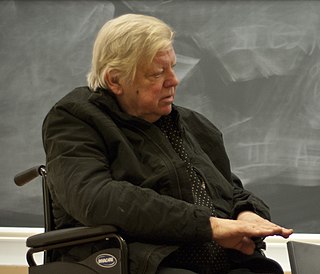A Quote by George Saunders
Now I began to understand art as a kind of black box the reader enters. He enters in one state of mind and exits in another. The writer gets no points just because what's inside the box bears some linear resemblance to "real life" -- he can put whatever he wants in there. What's important is that something undeniable and nontrivial happens to the reader between entry and exit.
Related Quotes
The poem is not, as someone put it, deflective of entry. But the real question is, 'What happens to the reader once he or she gets inside the poem?' That's the real question for me, is getting the reader into the poem and then taking the reader somewhere, because I think of poetry as a kind of form of travel writing.
We must be forewarned that only rarely does a text easily lend itself to the reader's curiosity... the reading of a text is a transaction between the reader and the text, which mediates the encounter between the reader and writer. It is a composition between the reader and the writer in which the reader "rewrites" the text making a determined effort not to betray the author's spirit.
Architects are today routinely indoctrinated against the dumb box. Even advertising urges us to "think outside the box." Why? Because it is thought we all hate the box for being too dumb, too boring, and we want to escape it. If we do escape, by buying the advertised product, we usually find ourselves inside another dumb box populated by boring people just like us. It is clearly possible to live an extraordinary life inside a dumb box. Question: is it possible to lead an extraordinary life in anything other than a dumb box?
If he loves, he wants to make a relationship out of it immediately! He wants to get married. He wants to create a certain conditioning. He wants to make it a contract. Or he enters a church, or he enters a political party, or he enters into any club and he wants to be structured, he wants to know where he stands in the hierarchy, in what relationship. He wants to have an identity - that 'I am this.' He does not want to remain uncertain. And life is uncertain. Only death is certain.
They are born, put in a box; they go home to live in a box; they study by ticking boxes; they go to what is called "work" in a box, where they sit in their cubicle box; they drive to the grocery store in a box to buy food in a box; they talk about thinking "outside the box"; and when they die they are put in a box.
As a reader, when the writer gets sentimental, you drift, because there's something fishy going on there. You recognize a moment that's largely about the writer and the writer's own need to believe in something that might not in fact exist. As a reader, you think, 'Where did the story go? Where did the person I'm reading about go?'
The analytical writer observes the reader as he is; accordingly, he makes his calculation, sets his machine to make the appropriate effect on him. The synthetic writer constructs and creates his own reader; he does not imagine him as resting and dead, but lively and advancing toward him. He makes that which he had invented gradually take shape before the reader's eyes, or he tempts him to do the inventing for himself. He does not want to make a particular effect on him, but rather enters into a solemn relationship of innermost symphilosophy or sympoetry.
The writer's job, after all, is not to dictate meaning, but to give the reader enough pieces to create his or her own satisfying meaning. The story is truly finished—and meaning is made—not when the author adds the last period, but when the reader enters the story and fills that little ambiguous space, completing the circuit, letting the power flow through.
The book is finished by the reader. A good novel should invite the reader in and let the reader participate in the creative experience and bring their own life experiences to it, interpret with their own individual life experiences. Every reader gets something different from a book and every reader, in a sense, completes it in a different way.
Limited points of view let the writer dispense - and the reader gather - information from various corners of the story. It all becomes a kind of dance, with the writer guiding the reader through the various twists and turns. The challenge is keeping readers in step, while still managing to surprise.






































